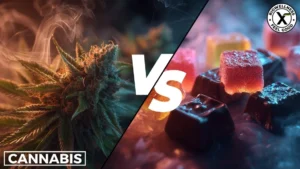Cannabis has come a long way—from something whispered about to something your neighbor might casually mention over brunch. With so many headlines, opinions, and product options out there, it’s no surprise that even longtime cannabis users can get mixed signals. Whether you’ve tried it once (hello, lifetime cannabis use) or it’s part of your wellness routine, knowing what’s fact vs. fiction can help you make confident, informed choices. And if you’ve heard things like “it’s totally safe” or “it’s the same as other drugs,” don’t worry—we’re diving into those myths too.
From medical uses like easing nausea during chemotherapy to recreational use on a chill Friday night, cannabis shows up in a lot of ways. Let’s break down five common myths and get to the truth together.
Myth #1: “Cannabis Isn’t Addictive”
When it comes to cannabis and mental health, the science is clear: cannabis use can have a significant impact on your mind and well-being. According to the Mental Health Services Administration and the American Psychiatric Association, frequent cannabis use—especially among young adults—can increase the risk of developing mental health disorders, including anxiety, depression, and even psychotic disorders like schizophrenia. Cannabis use disorder is now recognized as a real mental health condition, marked by a persistent desire to use cannabis despite negative consequences and unsuccessful efforts to cut down.
Research shows that smoking cannabis can lead to withdrawal symptoms such as irritability, restlessness, decreased appetite, and trouble sleeping. These symptoms can make it challenging for some users to stop, contributing to substance abuse and other mental health concerns. Cannabis intoxication can also affect cognitive functions, including working memory, decision making, and reaction time, which may impact daily life and responsibilities.
On the flip side, medical cannabis has been approved by the FDA for certain medical conditions, such as chronic physical discomfort and multiple sclerosis. However, using cannabis products for medical purposes should always be done under the guidance of a healthcare professional to minimize adverse effects and ensure safe, effective treatment. Ultimately, understanding the relationship between cannabis use and mental health empowers you to make informed choices and seek support if needed.
Myth #2: “You Can’t Overdo It”

It’s easy to see why this one’s so common—unlike other substances, cannabis use isn’t linked to fatal overdose. That gives a lot of people the impression that it’s totally risk-free.
But here’s the deal: while it’s true that cannabis itself won’t cause a fatal overdose, taking too much—especially with high-potency products like edibles or concentrates—can still be a rough ride, leading to cannabis use disorder (or CUD). Think intense anxiety, confusion, or even a trip to the ER. And when the use of cannabis becomes heavy or long-term, it can lead to real impacts on memory, focus, and even mental health. In some cases, frequent cannabis use is associated with substance use disorder or contributes to mental disorders, especially in vulnerable individuals.
That doesn’t mean you shouldn’t use it—it just means you should use it smartly. Understanding your limits, knowing what’s in your products, and not assuming all cannabis is the same (especially when comparing recreational strains to FDA-approved medications) makes the whole experience a lot safer—and way more enjoyable.
Myth #3: “Cannabis is Always Safer Than Alcohol”
It’s easy to see why people think cannabis is the “safer” option—fewer hangovers, less aggression, and it’s often marketed as a wellness tool. For a lot of young people, it just feels like the better choice compared to alcohol.
But here’s the reality: while cannabis may have some benefits, it’s not always risk-free. Heavy cannabis use, especially among teens and young adults, can affect developing brains and may increase the risk of impaired driving ability, poor decision-making, and even suicidal ideation in some cases. Both alcohol and cannabis come with harmful effects—not just for individuals, but for public safety too. The truth is, recent studies are showing that cannabis, like any substance, can impact mental health, behavior, and long-term well-being.
That doesn’t mean you have to avoid it—it just means being intentional. Knowing the risks, especially for young people, helps you make smart, informed choices about what you use and when.
Myth #4: “All Cannabis is Basically the Same”
No wonder this myth sticks around—between THC, CBD, indica, sativa, and all the different product types, cannabis can feel like a lot to figure out. Even experienced users can get tripped up trying to make sense of it all.
But here’s the truth: not all cannabis is created equal. Cannabinoids interact with the same group of brain regions, but depending on how you’re consuming them—like edibles vs. smoking cannabis—you might feel completely different effects. Memory, focus, mood… all of that can shift depending on the product, your tolerance, and other factors like setting or mindset. And let’s not forget—cannabis smoke still carries risks, especially with frequent use.
As the science around developing cannabis continues to grow, so does our ability to choose products that support specific goals. A little knowledge really can make a big difference—especially when you’re looking for support with sleep, stress relief, or productivity. Understanding how it interacts with the part of the brain responsible for decision-making and mood gives you more control over your experience.
Myth #5: “It Doesn’t Affect Teen Brains”
It’s easy to overlook the risks because cannabis often feels less harmful than other substances like drug or alcohol depend issues that get a lot of attention. Especially for young males, cannabis can seem like a low-risk choice compared to harder drugs.
But the truth is, adolescent brains are still developing, and cannabis use during this critical time can impact that process. The prefrontal cortex—the part of the brain responsible for decision-making, focus, memory, and problem-solving—is particularly vulnerable. Studies on college students show that early cannabis use can affect academic performance and cognitive growth. Plus, while some might think cannabis isn’t addictive, it can lead to cannabis addictive behaviors and contribute to patterns of drug use that affect long-term health.
The empowering takeaway? Waiting until adulthood to use cannabis supports healthier brain development, but it doesn’t close the door on exploring it responsibly later on.
Final Thoughts: Stay Curious, Stay Informed, Stay Safe
Cannabis use is a complex topic that touches on health, policy, and personal choice. While cannabis offers potential therapeutic benefits, it also comes with significant risks—including cannabis use disorder, substance abuse, and mental health challenges. Staying curious and informed about the latest research, health effects, and regulations is the best way to protect yourself and those around you.
For accurate, up-to-date information, turn to official government websites like the National Institute on Drug Abuse (NIDA) and the Substance Abuse and Mental Health Services Administration (SAMHSA). If you or someone you know is struggling with cannabis use disorder or related issues, seeking medical attention from a qualified professional is a crucial first step. Remember, cannabis use disorder is treatable, and support is available.

Legal Disclaimer:
By reading this information presented, you agree to release the author of any liability that comes from using this data. This post contains no legal advice. Claims about cannabinoids have not yet been approved by the FDA. This article was written in 2025, cannabis laws and regulations are subject to change. Read the full legal disclaimer here.
References
- https://link.springer.com/article/10.1186/s42238-023-00197-6
- https://www.sciencedirect.com/science/article/abs/pii/B9780323897730000242
- https://www.sciencedirect.com/science/article/abs/pii/S0277953623005464
- https://www.mdpi.com/1420-3049/28/24/8047
- https://www.sciencedirect.com/science/article/abs/pii/B9780323897730000242
- https://pmc.ncbi.nlm.nih.gov/articles/PMC10369762
FAQs – Uncovering the Truth Behind Cannabis
While cannabis can lead to dependency in some users, it is generally considered less physically addictive than substances like alcohol or tobacco. However, cannabis use disorder is recognized by official government organizations and should be taken seriously, especially for heavy or long-term use.
Yes. Smoking cannabis produces many of the same toxins found in tobacco smoke, which can increase the risk of respiratory issues such as chronic bronchitis. Considering alternative consumption methods can reduce these risks.
Cannabis use, especially when unregulated or heavy, can influence public health through effects on mental illness rates, impaired driving, and respiratory health. Official government organizations monitor these trends to inform policy and safety guidelines.
Always consult secure websites and gov websites, such as those run by national health agencies or public health departments. These sources provide scientifically backed data and help you stay safely connected to accurate information.
Cannabis may exacerbate certain mental illness symptoms in vulnerable individuals. It’s important to discuss cannabis use with healthcare providers, particularly if you have a history of psychiatric conditions.







